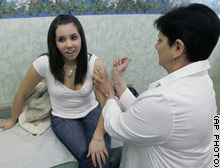Cervical cancer vaccine meeting roadblocks
By weee_ann
@weee_ann (1453)
Philippines
February 2, 2007 7:39pm CST
TRENTON, New Jersey (AP) -- Girls jumping rope chant "one less, one less," in TV commercials for the new cervical cancer vaccine Gardasil, vowing they will be one less cancer patient.
But in the real world, Gardasil is getting used less than doctors would like. Pediatricians and gynecologists from Arizona to New York are refusing to stock Gardasil because of its $360 price for the three doses required and "totally inadequate" reimbursement from most insurers.
Pediatricians, in particular, are rebelling, fed up after years of declining insurance reimbursement for vaccines, an explosion of new vaccines and fast-escalating vaccine prices.
Many practices must tie up $50,000 or more in vaccine inventory, run multiple refrigerators, insure the vaccines and spend lots of time on inventory management. They also must absorb the cost of broken or wasted vials and say that's not possible with most insurers reimbursing at just $2 to $15 over the $120 per dose charged by Gardasil's developer, Merck & Co. of Whitehouse Station, New Jersey."Doctors are drawing a line in the sand on this. They're either not giving it or requiring a surcharge," said Dr. Daniel Schwartz of Broadway Pediatrics Associates in Westport, New Jersey, which charges patients a $25 surcharge per shot.
Dr. Jill Stoller of Chestnut Ridge Pediatric Associates in Woodcliff Lake, New Jersey, said the inadequate insurance reimbursement for Gardasil is keeping "a wonderful new vaccine" from many patients."It really is a shame," said Stoller, who also assesses a surcharge.
Pediatricians and gynecologists at solo and large group private practices contacted by The Associated Press said they would, at best, break even if they stocked the vaccine. Most will give patients a prescription to get filled and bring back, but that could cost patients far more."I don't know where to turn," said Julie Falco, a Marlboro, New York, elementary school teacher trying to get her 13- and 15-year-old daughters vaccinated.
Her pediatrician, Dr. Herschel Lessin told her his 20-doctor Children's Medical Group in Poughkeepsie, New York, can't afford to stock Gardasil.
Lessin said insurers paying their executives millions won't give him $25 to cover his costs, but will spend tens of thousands if a patient develops cervical cancer.
His practice will provide prescriptions but warned Falco her insurer might not reimburse her and pharmacies might mark each dose up to $200. Falco then tried her gynecologist, who sent her back to the pediatrician."I still don't have the shot and now I have to decide whether I want to make a $1,200 investment to get them vaccinated," she said. "I really don't want to deny them what I think is right."Dr. Michael Blum, senior partner in a big pediatric practice in suburban Kansas City, said it only provides Gardasil to patients who pay $450 up front, then tries to get insurance reimbursement for them. Only a half-dozen patients have done so.
Dr. Kathleen Moore of AppleTree Pediatrics in Tyler, Texas, said as a solo practitioner she not only can't stock Gardasil but can't afford it for her own 12- and 13-year-old daughters. When she explains the situation to patients, "they all say 'We'll be happy to wait,' because they can't afford to pay for it either."Girls should get the vaccine before they are sexually active, say medical groups representing pediatricians, gynecologists and cancer specialists. That's because Gardasil, launched last June, prevents cervical cancer by blocking infection from the two strains of human papilloma virus -- a common sexually transmitted disease _ that cause most cervical cancer. It also protects against genital warts.
Experts recommend routinely vaccinating 11- and 12-year-old girls, who get other shots then, and say Gardasil can be given to girls as young as 9 and as a catch-up for those 13 to 18.
The Food and Drug Administration has approved it for females up to age 26. Merck is conducting tests on older women and boys.
Some pediatricians say many gynecologists just don't want to deal with Gardasil.
Dr. Joseph Piacente of Mesa Pediatrics in Arizona said his practice hopes to be able to afford to start stocking Gardasil by summer, but two gynecology practices nearby tell him they won't handle it.
With many 18- to 26-year-old women uninsured, gynecologist Dr. Rhoda Sperling at Mount Sinai Medical Center in New York said only about half her patients who are not in long-term monogamous relationships are getting Gardasil.
Only a few of Planned Parenthood's 860-plus U.S. health centers offer Gardasil so far, but the federal Vaccines for Children program recently sent just over 1.3 million doses to states for girls covered by Medicaid or state-subsidized children's health insurance.
Doctors say manufacturer Merck should do more to help, given that Gardasil is the most expensive vaccine ever. They say it gives them a couple months to pay but not the customary discount for ordering multiple vaccines.
Merck, which notes Gardasil is covered by 96 percent of insurance plans, recently added Gardasil and its other adult vaccines to its patient assistance program, but only about 800 doses total were given away in the last three months of 2006.
The American Academy of Pediatrics says insurers should be paying at least 17 percent over a vaccine's price to cover all costs, and it is talking with insurers to win higher reimbursements.
Two have agreed.
Horizon Blue Cross Blue Shield, New Jersey's biggest insurer, now gives $150 per dose plus a $21.50 administration fee -- for staff time and office overhead, plus supplies and syringe disposal.
Cigna HealthCare said it raised reimbursement "significantly" on Jan. 15 in most markets but would not disclose any figures. Doctors said it had been paying only $120 per dose.
A spokesman for the trade group America's Health Insurance Plans said patients whose doctors aren't stocking Gardasil should check with their insurer to see if there's another way to get it.
No responses





